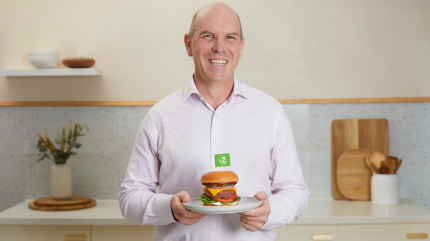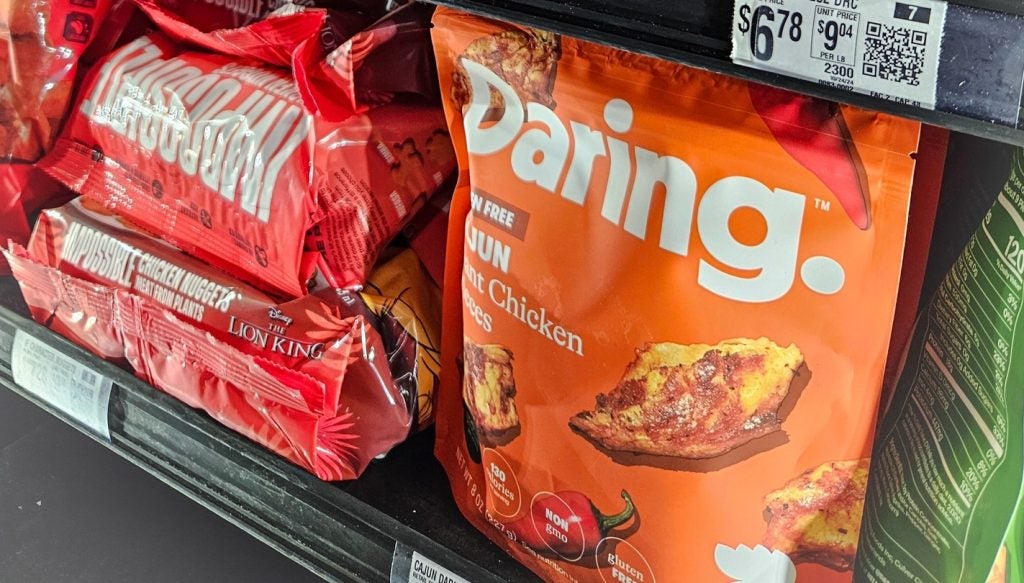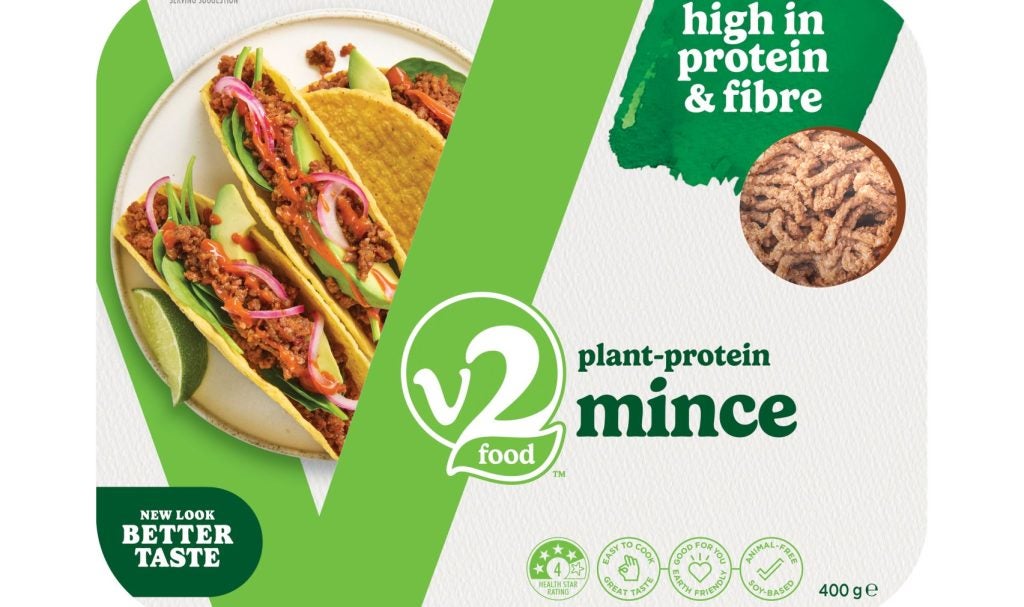
With the prospects for plant-based meat in the US in question, Australian specialist V2Food has snapped up California-based alt-chicken firm Daring Foods.
V2Food, which started business in Australia in 2019, has built a leading position in its home market and, despite the challenges facing plant-based meat in the US, remains a believer in the category there, CEO Tim York tells Just Food.

Discover B2B Marketing That Performs
Combine business intelligence and editorial excellence to reach engaged professionals across 36 leading media platforms.
York, a former CEO at Australian confectioner Darrell Lea, explains where he sees promise for plant-based meat in the US and sets out why V2Food has also teamed up with Japanese group Ajinomoto in Africa and Asia.
Dean Best (DB): What sparked the move for Daring? How long was V2Food working on the deal?
Tim York (TY): We probably first started looking at it in November last year and then, sort of March, got quite serious on it, did due diligence and the supply chain. We then needed to see a couple of proof points in the supply chain up until July. Once we knew that we could manage the supply chain transition that we’re looking for, everything happened pretty quickly.
DB: What parts of the supply chain were you looking at?
TY: We were looking at how we could bring more of the manufacturing into the US. At the moment, the supply chain is predominantly out of Europe.
DB: Have any changes started?
TY: It’s in the process of happening now, so within the next three to six months.

US Tariffs are shifting - will you react or anticipate?
Don’t let policy changes catch you off guard. Stay proactive with real-time data and expert analysis.
By GlobalDataDB: How would you describe Daring’s presence within the US plant-based meat market?
TY: It’s really strong, with about 45% market share but only in the tiniest segment in the plant-based meat market there. In uncrumbed chicken products, it’s dominant but uncrumbed chicken products equates to about 3% of the total plant-based market. We see a really strong opportunity to take a really strong brand and grow the formats and protein types that it sells.
DB: It’s a tricky time to be investing in plant-based meat in the US.
TY: Why do you say that?
DB: The recent performance of the category, demand slowing, there has been a number of companies that have come out and said it’s become a tougher place to do business.
TY: Yes, I mean, if you look at the US market, the fresh chilled category has certainly had a lot of headwinds and you’ve seen that segment drop by 20% per annum, probably for the last three years in a row. Fundamentally, we don’t really see the chilled category working in the US. We’re much more bullish on frozen. If you look at the frozen category, largely it has been in either single-digit growth or single-digit decline for most of that time and it’s certainly held up a lot better than fresh.
DB: Why hasn’t the frozen segment faced the same headwinds and what gives you confidence that part of the plant-based meat market in the US can pick up?
TY: The frozen part of the market was more of an evolution than a revolution. You’ve had brands like Morningstar and Quorn in that part of the store for many, many years, whereas the chilled category sort of had the big hype cycle of 2015 to 2020 and then the regression post that. We do think frozen is certainly a much more stable sort of single-digit-growth area of the store but the part of the category we think is going to grow faster than anything is in the cleaner-label products. Daring is a leader in that space where all of its products largely have five ingredients in them, which make them one of the shortest ingredients lists in the category.
DB: That speaks to some of the macro issues the whole category is facing over how processed the consumer perceives the products are, rightly or wrongly.
TY: Yes. It’s been well spoken by many people that taste, price, nutrition, convenience are the four key drivers of the category. Fundamentally, we see the taste of products is largely there or thereabouts. Price is still a problem and needs more work, which is probably going to be solved through scale. Nutrition – and nutrition means many things to many people – but fundamentally, a shorter ingredient list does seem to be shorthand for a simpler, healthier product.
The only two brands of scale that are growing in the US are Impossible and Daring.
DB: Many of Daring’s products have got five ingredients but will further renovation of the range be on your to-do list?
TY: We certainly look at the crumbed products and we see there are improvements we can make there through some of the intellectual property we’ve got. Then, when you look at moving into a lot of formats, one of the ingredients that everyone has to use today is methylcellulose and we’ve been working on some methylcellulose-free binders, which we think will really help to unlock the clean-label claim into a whole lot of new formats.
DB: Did the Daring business grow in its last financial year?
TY: It’s grown every year since it launched and grew at over 10% last year in the US. The only two brands of scale that are growing in the US are Impossible and Daring.
DB: Why do you think Daring’s managed to do that?
TY: I just think they’ve had a nicely curated brand and it has a very simple USP, having a cleaner ingredient deck than everyone else and that’s the part of the market that’s resonated most with consumers.
DB: The rising interest in protein is said to be boosting demand for meat in the US. That’s another challenge, isn’t it?
TY: I think a different way of looking at it is consumers’ appetite for protein is just growing and growing and the whole reason plant-based meat was first invented was really to look at how do you solve the growing needs of protein in the world? Fundamentally, there’s just not enough land, fertiliser, etc., to allow all that protein to come from beef. We’ve never sought to be an ‘or’ to animal protein. We’re an ‘and’. We definitely see that, as more protein is consumed, plant-based meat just has a bigger role in that, in that conversation.
We definitely are medium- to long-term big believers in the category. We see the transition is going to take longer than I think any of the commentators felt in, say, around 2015 to 2020. People were talking about this replacing up to 30% of animal meat in five years. That is fundamentally not true. We see it as a generational change that’ll take 30 years to grow.

DB: Is this deal a potential avenue for the V2Food brand to be launched in the US?
TY: It’s slightly nuanced in that we see a lot of new V2 products that will be launched in the US. It’s much more likely that we would use the Daring brand to launch them just because it already has equity in the market.
DB: What kinds of products do you expect to launch that were V2Food products in Australia under the Daring brand in the US?
TY: The products we’re talking about with the ingredients in them are new products that will be first to launch in the US with a much cleaner label but they’ll be certainly things that are very common to the market today, just with a much cleaner ingredient deck. They’ll be crumbed chicken products, formed beef products and then moving into beef strips as well.
DB: What could make those V2Food recipes more attractive to US consumers?
TY: Well, it’ll just come down to having a shorter ingredient list with more common ingredients than are currently in products today.
DB: The co-manufacturing changes will help on price. How else do you think you could try to reduce that price gap with meat?
TY: Scale is definitely one of the things that will help everyone to achieve economies but we just have a lot of proprietary ingredients in our tech stack, which means that, as they’re V2 ingredients, they don’t require a supplier margin to be built into them, and so that gives us an ingredient cost structure advantage as well.
DB: Is the Daring business profitable at the moment?
TY: It’s profitable at the gross margin line. It is not profitable at the bottom line. We expect it to be profitable in the next one to two years.
DB: On V2Food’s own performance, how’s that been in the last 12 months?
TY: Our business is predominantly an Australian business and, in Australia, we’re seeing the retail sector being relatively flat. In foodservice, we’re growing at 30-50% per annum. And, in QSR, we service the Burger King market, which is called Hungry Jack’s in Australia, and we see that is relatively low growth.
DB: What does that mean for the overall top line?
TY: Overall, on a like-for-like basis, it’s in modest growth.
DB: You’re coming up to the end of Q1 in your new financial year. How’s that looking year on year?
TY: Again, it’s still in modest growth.
DB: Within Australia, what do you see as the best growth opportunities for V2Food?
TY: There are a few different areas we’re working on. One is with hybrid products, where we’re blending V2 with animal protein. There’s a few different examples of where we’re trying to launch those products in the Australian market and also overseas. Just across the board, just generally, it’s more to do with bringing in NPD products that bring modest growth into the portfolio.
DB: Have you launched any of the hybrid products yet?
TY: Only in trials.
DB: What consumer needs are you looking to hit?
TY: When you’re looking at taste, cost and nutrition, by blending it together, you can get half the environmental benefit with zero taste compromise and some cost-of-goods savings. It ticks a number of boxes and has really no negative attached to it.
DB: Overall, how would you describe the development of the plant-based meat market in Australia?
TY: It is largely going through a similar phase to I think most sort of first-world markets. It started off with lots of brands entering the category. It’s definitely now going through a consolidation phase. As of today, about a third of all plant-based meat sold in grocery is under the V2 brand. We are the largest player in Australia and we do see that, as that consolidation happens, we’ll hopefully be a beneficiary of that.
DB: Is the market there growing?
TY: It’s relatively flat.

DB: Away from Australia, what are your principal overseas markets?
TY: The other product we’ve been working on is an emerging economies product, and then, rather than being chilled or frozen, it’s an ambient product. It’s sold in a sachet format and then the consumer effectively makes the meat at home.
DB: Where are those on sale?
TY: They’re in two places today. We’ve got a market trial in Africa and then another in one of the emerging markets in Asia.
DB: Which markets specifically?
TY: I can’t tell you the exact details of it.
DB: You’re working on these products with Ajinomoto as part of what the companies have called a “strategic partnership”. Has Ajinomoto bought a stake in V2Food as well?
TY: They have. I can’t disclose it. You can definitely call it a minority investment, though. It’s a relatively small investment.
DB: What was the rationale for the tie-up with Ajinomoto?
TY: We’ve been working with Ajinomoto now for a couple of years. That started with that emerging markets project that I just mentioned. In more recent times, they’ve sought to take investment in us and then they’ll also be a partner in the US, in that they have a large frozen meals business. They’ll effectively be a partner in launching a range of Daring frozen meal products.
DB: Will Ajinomoto be manufacturing for you over there as well?
TY: They won’t be manufacturing as such but they will be involved in the business.
DB: How do you envisage the two companies working together in Africa and Asia?
TY: At the moment, we’ve got two market trials going with them and then the hope is that they’ll become quite a broad market entry product across multiple geographies in Africa and emerging Asian countries.
The consumer testing that we’ve done with Ajinomoto in Africa, the results are off-the-rack exceptional
DB: What gives you and Ajinomoto confidence you can build a business in emerging markets like Africa and Asia?
TY: If you go back to the driving theory behind plant based, it was really around how do you feed the population as it grows from eight to ten billion people between now and 2050. When you get into markets like Africa, you’re not fighting against beef. You’re fighting against putting high-quality, nutritious, safe, available protein in people’s hands. The consumer testing that we’ve done with Ajinomoto in Africa, the results are off-the-rack exceptional. We’re very confident the proposition we’ve got is strong.
DB: What’s the scope for V2Food to make further acquisitions?
TY: It certainly could be the catalyst for more. Given that we’re a relatively small business, we’d want to swallow this one [Daring] properly before we took on another. We do see that there’s going to be quite a lot of consolidation in plant-based globally and we would hope that we will become one of the leaders in that consolidation process.
DB: Now you’ve got Daring in the books, what are your annual pro-forma net sales?
TY: We don’t quote a number but I could say pro-forma it would be somewhere between US$30m and US$50m.
DB: On potential acquisition targets, would you be looking at other assets in the US or in other markets?
TY: I think there’d be more synergy for us if it were in a different geographic area. Europe would be more likely, I think, than another acquisition in America.





